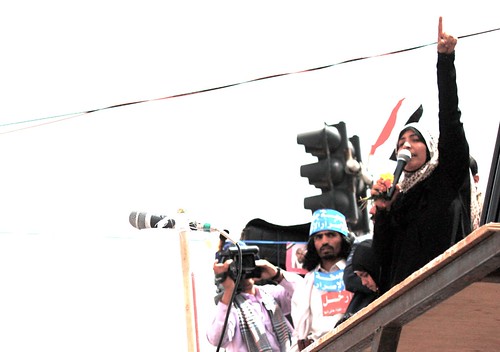
The final outcome of the political unrest that continues to shake the Middle East remains far from certain. With that in mind, on 11thJune more than 140 young scholars and students met at the London School of Economics and Political Science’s Middle East Centre for the Annual Graduate Conference of the British Society of Middle Eastern Studies. Change and Continuity in the Middle East: Rethinking West-Asia, North Africa and the Gulf After 2011 – sponsored by the International Relations and Security Network (ISN) and other donors – provided a forum for their views on a number of key issues.
The conference was organized into twelve panels, each tasked with assessing how the MENA region has changed since 2011. Under the chairmanship of John Chalcraft, the first panel considered those countries that were apparently not affected by the uprising. Case studies focussed upon Algeria, Jordan and Mauritania suggested that a lack of social cohesion has limited the capacity of peoples to gather a critical mass to contest the authority of some well-established regimes. This was followed by a panel discussion of the role of minorities in some of the changes engulfing the Middle East and North Africa. Consideration of such an issue is especially important as minorities in the Middle East have often found refuge and security under the protection of authoritarian regimes. Indeed, as the Iraqi experience painfully taught, sudden regime change (think of Tunisia, Libya and perhaps Egypt) may open a time of uncertainty for ethnic minorities. As a result, the panel discussed the situation from various points of view, including the Kurds, the Jews, the Copts, and minorities within Syria.
A discussion was also dedicated to the role of women and the impact of the upheavals upon their social status. Many have pointed out the important contributions that women have made to the Arab Spring. Accordingly, has political unrest opened up new spaces for women to voice their concerns? Indeed, have such concerns been effectively addressed in countries like Morocco where political reform helped to stave off widespread violence and unrest?
The conference also addressed themes that impact upon the overall regional system. Katerina Dalacoura chaired a panel, for example, considering the impact of the Arab Spring on regional powers like Turkey and Iran. In particular, panellists discussed to what extent Turkey actually represents a “model” striking a balance between secular principles and Islamist politics the region’s new regimes. Consideration was also given to the impact of the Arab Spring on the member-states of the Gulf Cooperation Council. Here questions were raised with reference to security threat perceptions, the role of women’s emancipation movements, the resilience of Islamists and the practice of patronage and corruption. In a separate panel, Rosemary Hollis chaired a discussion on how the political upheavals had impacted upon the Palestinian question.
Palestine’s Hamas movement also provided a case study for Fawaz Gerges’ panel on the transformation of Islamist political discourse. It was discussed how thinkers like Yusuf al-Qaradawi are rethinking their theories, as well as how political organizations are profoundly revising their roles and identities as a result of the new circumstances. This was in turn complemented by consideration of how the Arab Spring had impacted upon the foreign policies of the United States and United Kingdom. Panellists considered, for example, how Arab diaspora influenced foreign policymaking.
Beyond distinctly political issues, the conference also considered how the arts influenced political change across the MENA region. Hilary Kalmbach’s panel investigated the interrelation between literary, figurative and theatrical arts and the social upheavals. The panel concluded that the arts have been traditionally linked with the progressive affirmation of freedom of conscience, opinion and expression and their increasing social importance in the past years can hardly be coincidental. Consideration was also given to how culture, memory and symbols contribute to understanding the newly emerging social and political reality of the MENA region. Issues under discussion included changes to national symbols such as flags and the use of the veil among Tunisian women.
The role of the media and social networks throughout the Arab Spring cannot be underestimated. With this in mind, Fatima al-Issawi’s panel focused upon the importance of satellite TV and the internet as well as the monitoring of media accommodation of Islamist parties during and after the upheavals. There was also a discussion on the emergence of new physical and virtual public ‘spaces’ or ‘spheres’ in countries like Egypt and Tunisia. However, as events in Syria best demonstrate, whether these changes will become permanent still remains very much an open question.
The variety of points of view and research contributions offered by this dynamic group of young scholars shows how academic research on the Middle East is at a turning point. The events of 2011 and 2012 in the Middle East have not only brought about unexpected change to the region but inevitably reset the scholarly agenda of Middle Eastern studies.
Disclaimer: the author speaks only in his personal capacity, the opinions expressed herein are only his own and do not represent the views of BRISMES or any other entity.
Filippo Dionigi is a PhD Candidate in International Relations at the London School of Economics and Political Science and is the Acting President of the Graduate Section of BRISMES. He is researching on the impact of international norms on Islamist Politics and is specialised on Hezbollah. Dionigi has published on the Journal of International Political Theory and occasionally contributes to on-line current affairs magazines and blogs.
For further information on the topic, please view the following publications from our partners:
What Can Arab Countries Learn from the Post‐Communist Transition?
The Emperor Has No Clothes: Palestinians and the End of the Peace Process
For more information on issues and events that shape our world please visit the ISN’s Security Watch and Editorial Plan.

